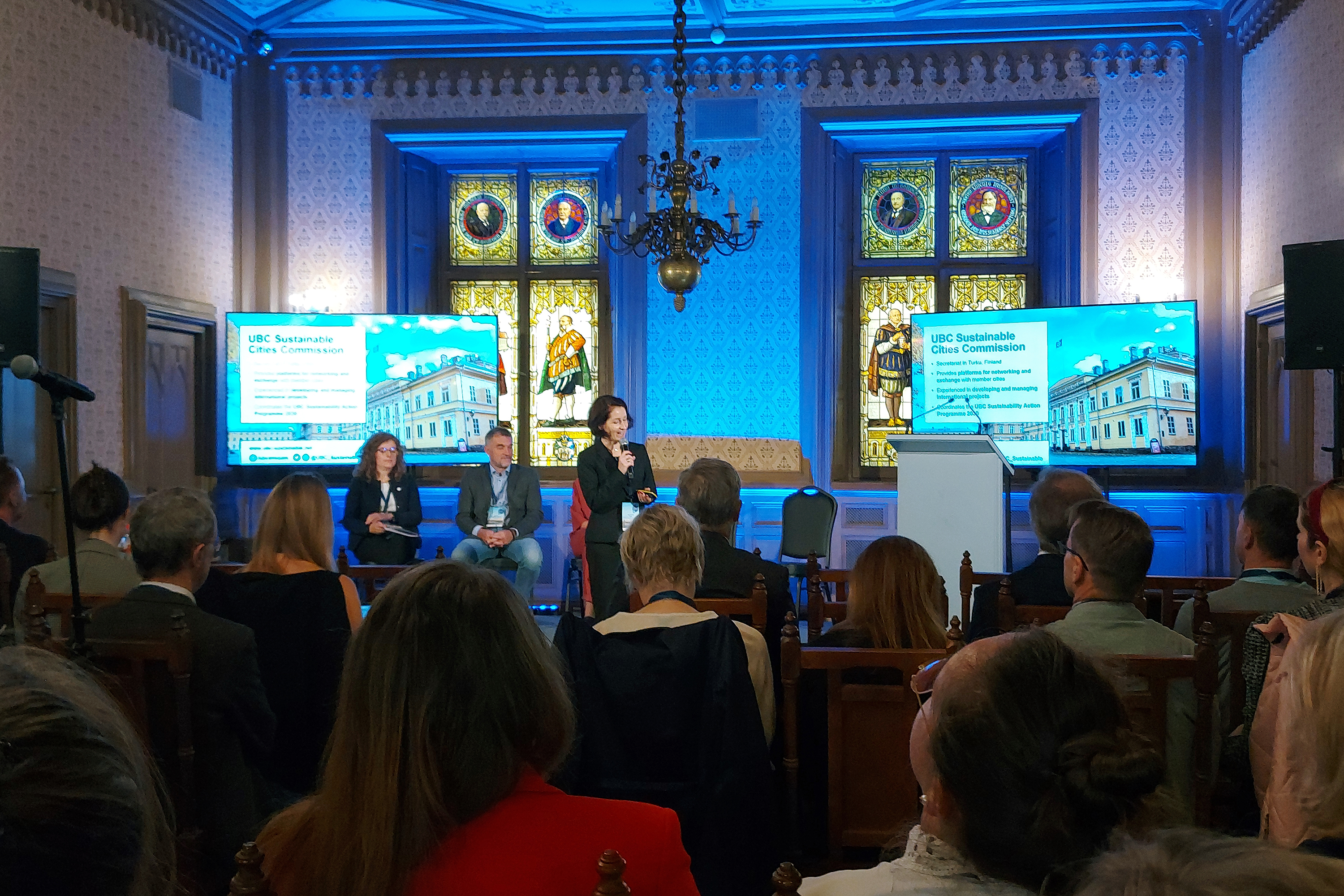The 14th Annual Forum was organised jointly by the Riga City Council, Union of the Baltic Cities and VASAB, in close cooperation with the Ministry of Foreign Affairs of Latvia and the Baltic Sea Strategy Point. Riga, one of the most active cities in the UBC network, is also in the EU City Mission, and has high ambitions towards reaching climate neutrality. The Forum received a lot of attention, and the participants count reached 575 guests.
Targets and measures from city leaders
The forum opened on 4 October with a set of parallel workshops, and our Sustainable Cities Commission had a strong representation there. At the workshop "Driving collaborative decarbonization and climate adaptation in the Baltic Sea Region", Head of SCC Secretariat Agnieszka Ilola joined as a panelist, presenting our network actions related to decarbonization and the climate aspirations of our member cities. Cities are the key actors for reaching crucial emissions reductions and BSR cities are already increasingly recognized as global forerunners in being climate-smart and green transition.
However, to meet ambitious climate targets and make Europe climate neutral by 2050, cities and municipalities need to be much more visionary, supported with brave leadership committed to strategic action plans with clear and measurable targets, strong public-private partnerships and active engagement of citizens.
“Political and business leaders must develop targets and measures to make sure that we are moving quickly towards more sustainable and carbon neutral future,”
– Agnieszka Ilola.
Transition to carbon free systems is not only about technological innovation but profound changes in lifestyles and behaviors along with innovative governance models. Such transformations cannot be imposed from the top – instead, they need to be embraced and shaped by cities based on strong multilevel cooperation.
UBC perspectives across the Forum stages
One of the parallel sessions on 5 October, the seminar "Youth Empowerment 2.0 in the 21st Century – Trends and Policy Solutions" was organised by UBC together with City of Riga. In the discussion steered by the Head of UBC Antenna in Brussels Marko Paunovic, speakers discussed the subject of empowering young people to shape a better future with digital transformation, education, and active citizenship. Chairman of the UBC Youthful Cities Commission Dmitrijs Zverevs emphasized the importance and different levels of meaningful youth participation.
“We need to keep in mind 'cultural toolkits' of young people of various backgrounds, and be aware of the transnational character of current trends,”
– Dmitrijs Zverevs.
Another set of concrete experiences was brought up at the closing session "Interreg Funding for the Macro-Region" focusing on successful examples of transnational cooperation over the currently celebrated 25 years of Interreg. There, Björn Grönholm, Director of Strategic Projects in the City of Turku and former Head of SCC Secretariat presented how the transnational cooperation worked 15 years ago, with an example of PURE project where the UBC SCC was the Lead Partner. PURE project succeeded in motivating cities for voluntary actions improving the state of the Baltic Sea through upgrading their wastewater treatment systems to stricter HELCOM standards.
“Local know-how and experiences are crucial for successful implementation of the ambitious measures agreed at the national level,”
– Björn Grönholm.
The pinnacle of networking
Networking village is always a highlight and major attraction of the EUSBSR Forums, and it did not disappoint this year either. UBC held a stand there, with several UBC bodies joining the exchange, incl. UBC General Secretariat, together with Learning, Safe, Sustainable, and Youthful Cities Commissions.
We were happy to inform visitors about our Commission’s activities, as well as to invite them to follow our current projects, funded by the Interreg Baltic Sea Region Programme (the stand of which you could find conveniently close for extra support!):
- EMPEREST focusing on removal of organic micropollutants from the water stream with cooperation on local and regional level, in both developing the recommendations and testing technological solutions;
- BALTIPLAST aiming at reduction of single-use plastic, addressing cities, businesses and households with tailored measures.
And we were very excited to provide teasers of the projects launching in November 2023: SUMPs for BSR focusing on green active mobility and Climate-4-CAST preparing a tool to support cities' progress towards climate neutrality; both are also co-funded by Interreg BSR.

On the photo: Lotta Lehti (project coordinator of EMPEREST), Adham Maharramli (project officer in BALTIPLAST), Agnieszka Ilola (UBC SCC Head of Secretariat), Mariia Andreeva (UBC SCC communications coordinator)
All in all, this Forum was a long-awaited opportunity for the Baltic Sea Region family to come together and reconfirm the joint ambition towards ensuring the region’s sustainability and safety. Indeed, the event endorsed the understanding that the Baltic Sea Region is a front-runner in many fields, such as renewable energy, water management, sustainability-oriented citizens or innovation ecosystems. Annual Forums enable continued development in these fields and many others, as new connections are created and old ones strengthened. That’s why we’re already looking forward to the next Annual Forum!
